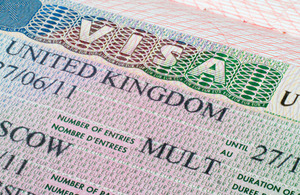All-new Immigration (European Economic Area) Regulations and 2016's second Statement of Changes released
The Government has today published the new Immigration (European Economic Area) Regulations 2016 and a new Statement of Changes to the Immigration Rules (HC 667).
 Image credit: UK GovernmentThe new Immigration (European Economic Area) Regulations 2016 can be read here (and on EIN here). This will mostly take effect from 1st February 2017.
Image credit: UK GovernmentThe new Immigration (European Economic Area) Regulations 2016 can be read here (and on EIN here). This will mostly take effect from 1st February 2017.
The explanatory memorandum to the new Regulations states: "The 2016 Regulations in large part consolidate and clarify the provisions under the 2006 Regulations, modernising the language used and simplifying terms where possible in line with current drafting practice. They also make changes to give effect to certain judgments of the Court of Justice of the European Union (‘CJEU’) and address issues concerning the practical application of the Directive within the UK.
"This includes setting out in detail the factors that should be taken into account when considering an application from a family member of a British citizen for a right to reside in the UK under the Directive, in order to tackle the high levels of abuse and prevent the circumvention of the domestic immigration system.
"The 2016 Regulations also clarify the basis on which restrictive measures may be taken to restrict the free movement rights of people who pose a threat to the UK by setting out a non-exhaustive list of the ‘fundamental interests of society’. This is a statement about a range of the circumstances in which the government will seek to restrict a person’s free movement rights by removing or excluding them from the UK because of the threat their conduct poses. The 2016 Regulations require courts or tribunals to take into account these interests when considering, for example, an EU nationals appeal against a deportation decision."
Today's new Statement of Changes runs to 90 pages and can be read here.
The explanatory memorandum states that the main purpose of these changes to the Immigration Rules is to:
• Implement the first of two phases of changes to Tier 2, announced by the Government on 24 March 2016 following a review by the independent Migration Advisory Committee.
• Introduce a new English language requirement at level A2 of the Common European Framework of Reference for Languages for applicants for further leave in the UK as a partner or parent, after completing 30 months here on a 5-year route to settlement under Appendix FM.
• Mandate the refusal of limited or indefinite leave where the applicant has been excluded under Article 1F from the Refugee Convention or under paragraph 339D from a grant of humanitarian protection or is a danger to the security of the UK or, having been convicted by final judgment of a particularly serious crime, is a danger to the community of the UK.
• Clarify when Dublin transfer, safe third country and first country of asylum rules apply and provide a definition of the third country concepts within the Immigration Rules.
The changes take effect from 23 November 2016.
Announcing the Statement of Changes, the Minister of State for Immigration, Robert Goodwill, told the Commons in a Written Statement:
"My Rt Hon Friend the Home Secretary is today laying before the House a Statement of Changes in Immigration Rules as set out below. These changes continue our reforms to the UK immigration system.
"The changes we are making to the Rules will ensure that those who do not qualify for international protection on account of their conduct, for example serious criminality, are not granted settlement or limited leave to remain in the UK under the Immigration Rules.
"We are also abolishing the ‘28-day grace period’, during which we currently accept out of time applications for a range of routes including work and study, to encourage greater compliance with the Immigration Rules. This will make clear that people must comply with the Rules and make any application for further leave before their current leave expires.
"The changes also include the reduction in the threshold of NHS debt from £1000 to £500 for family cases and armed forces cases to align with changes made elsewhere in the Rules in April 2016.
"The changes also provide for a new English language requirement for non-European Economic Area national partners and parents applying to extend their stay in the UK. The new requirement, which can be met by passing, as a minimum, an A2 level Common European Framework of Reference for Languages speaking and listening test, will apply to partners and parents whose current leave on a five-year route to settlement under the family Rules is due to expire on or after 1 May 2017.
"The new A2 requirement will deliver on the Government’s manifesto commitment to ensure that those coming to the UK on a family visa with only basic English become more fluent over time. We believe this will improve integration in communities. An associated Statement of Intent and Policy Equality Statement will be published today on Gov.uk.
"Following a review by the independent Migration Advisory Committee, on 24 March 2016 the Government announced two phases of reforms to Tier 2, to be implemented in autumn 2016 and April 2017. The changes being laid today implement the first phase of these reforms. This includes changes to the salary thresholds for Tier 2 (General) and short-term Intra-Company Transfers (ICTs), and closure of the ICT skills transfer category. There are exemptions from the new salary for certain occupations in health and education.
"We are also making technical changes to the Immigration Rules to clarify the concepts of a first country of asylum and a safe third country."